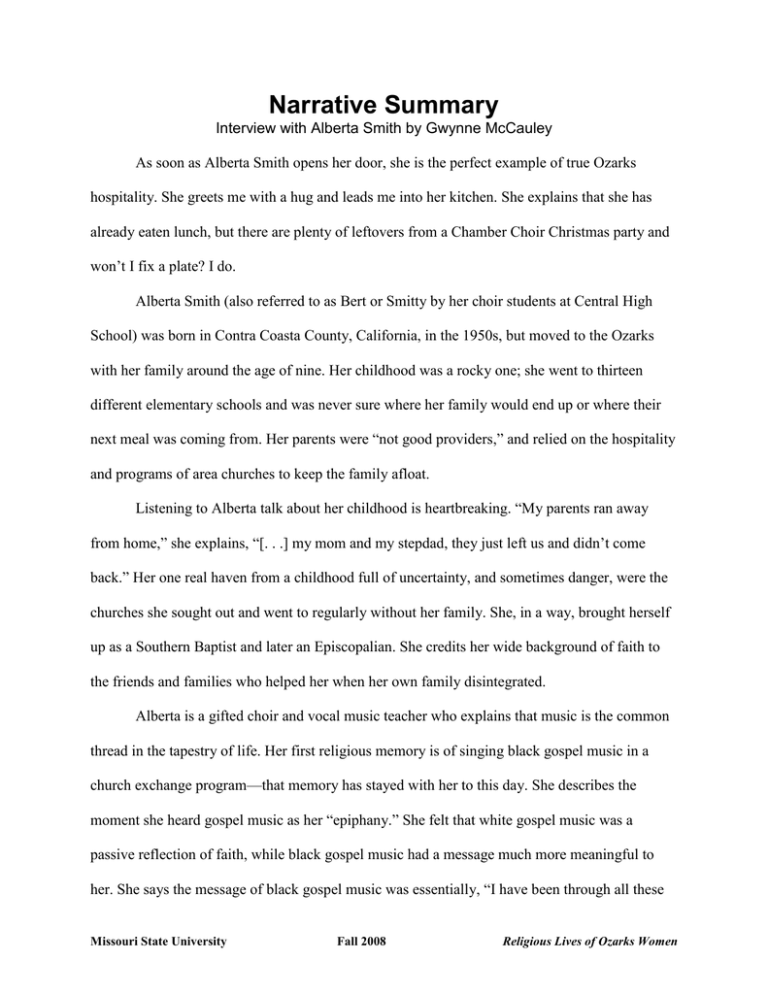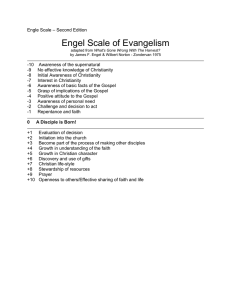Narrative Summary
advertisement

Narrative Summary Interview with Alberta Smith by Gwynne McCauley As soon as Alberta Smith opens her door, she is the perfect example of true Ozarks hospitality. She greets me with a hug and leads me into her kitchen. She explains that she has already eaten lunch, but there are plenty of leftovers from a Chamber Choir Christmas party and won’t I fix a plate? I do. Alberta Smith (also referred to as Bert or Smitty by her choir students at Central High School) was born in Contra Coasta County, California, in the 1950s, but moved to the Ozarks with her family around the age of nine. Her childhood was a rocky one; she went to thirteen different elementary schools and was never sure where her family would end up or where their next meal was coming from. Her parents were “not good providers,” and relied on the hospitality and programs of area churches to keep the family afloat. Listening to Alberta talk about her childhood is heartbreaking. “My parents ran away from home,” she explains, “[. . .] my mom and my stepdad, they just left us and didn’t come back.” Her one real haven from a childhood full of uncertainty, and sometimes danger, were the churches she sought out and went to regularly without her family. She, in a way, brought herself up as a Southern Baptist and later an Episcopalian. She credits her wide background of faith to the friends and families who helped her when her own family disintegrated. Alberta is a gifted choir and vocal music teacher who explains that music is the common thread in the tapestry of life. Her first religious memory is of singing black gospel music in a church exchange program—that memory has stayed with her to this day. She describes the moment she heard gospel music as her “epiphany.” She felt that white gospel music was a passive reflection of faith, while black gospel music had a message much more meaningful to her. She says the message of black gospel music was essentially, “I have been through all these Missouri State University Fall 2008 Religious Lives of Ozarks Women 2 trials and I am gonna make it through this.” That was a much more fitting theme for her life at the time. She still sings gospel music, considering it her own way of serving God. She says, “I feel closest to God when I sing.” As she talks to me about her faith and her views on music, church as an institution, and the role women play in religion, I realize I am listening to a woman whose wisdom is the kind that would end up on a day-to-day calendar that one would buy for a spunky aunt. “People are flawed, and churches are filled with people,” she explains as she talks to me about the sexism and discrimination she experienced while being employed with area churches as a choir director. Not long after college, she applied for a choir director position at a local Baptist church and wasn’t even called for an interview despite being one of the most educated applicants. Unwilling to accept being shut out because of her gender, she called the church and talked to the pastor. She demanded an interview and got the job. Alberta talks about the patriarchal structure of Ozarks churches, but fails to say anything damaging. She is the product of how much good churches do in the world, and she wants everyone to know how much good they really do. When I ask her where she would be without churches, she starts to cry. “I might have starved to death for one thing [. . .],” she says. She reminds me of all the things that are provided by church programs: food baskets, shelter, clothes, help finding jobs, after school programs, and her list goes on. “What organization would pick up that slack?” she asks. She tells people to be part of the solution in church, to go with a mind to serve not just a mind to receive. Her personal views on faith are some of the most touching. She tells me that the most significant thing about being an active member in her faith is to be a servant of the Lord. Singing is one of the ways she serves. “I don’t want to sing for the glory of me,” she explains when I ask Missouri State University Fall 2008 Religious Lives of Ozarks Women 3 her how faith and music share her heart. She also says that the one thing she wants to do is be a blessing to other people. “I really believe that God uses people to intervene in the lives of other[s],” she explains. She tells of the people sent to her in some “dire straits,” and it is easy to see by the light in her face that she is truly blessed. Before the interview ended, Alberta sang this song for me; it is a song that is not only a favorite of hers, but a summation of what her faith means to her: My faith has found a resting place not in device or creed. I trust the ever-living one; his wounds for me shall plead. I need no other argument. I need no other plea. It is enough that Jesus died, and that he died for me. Missouri State University Fall 2008 Religious Lives of Ozarks Women


